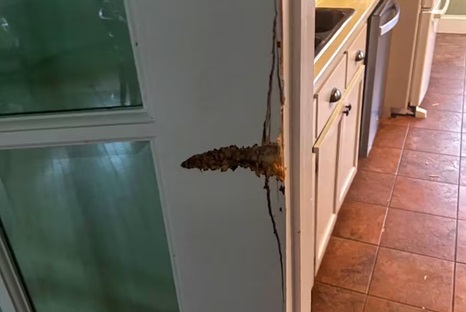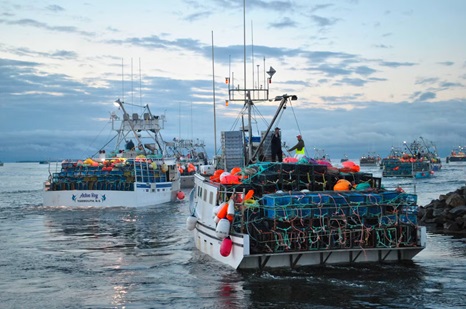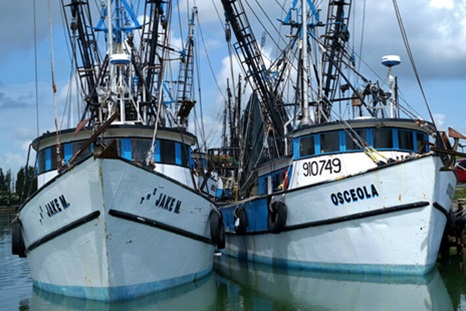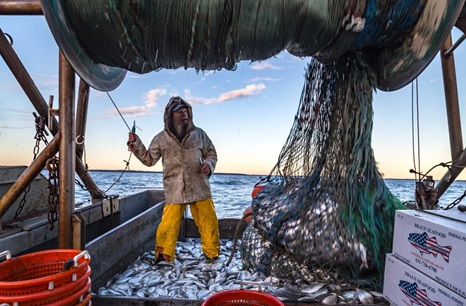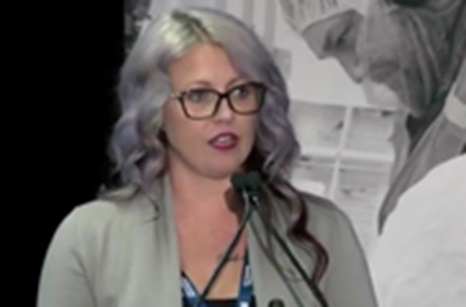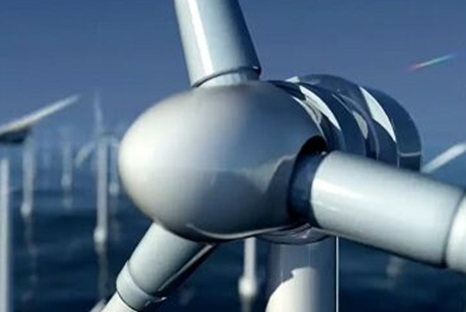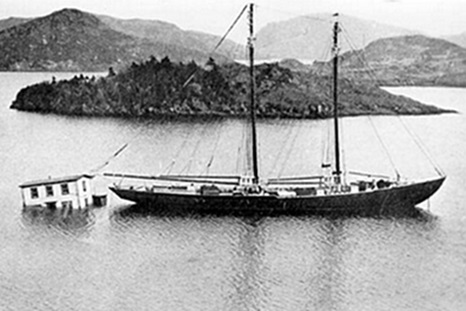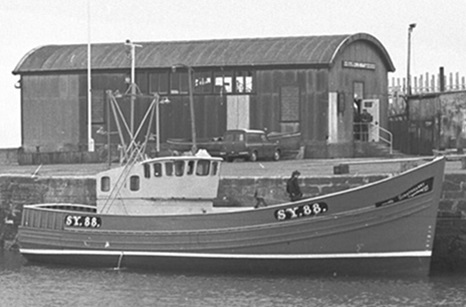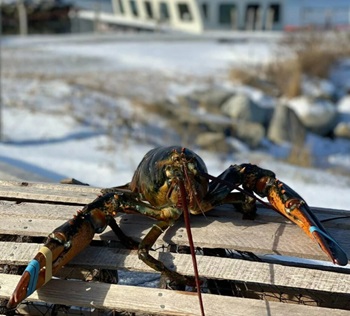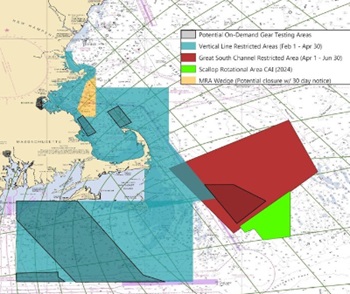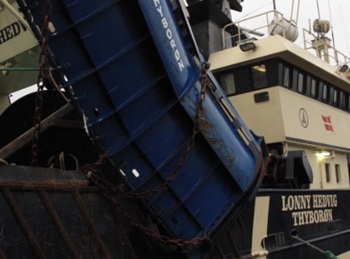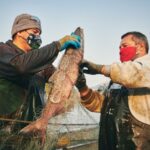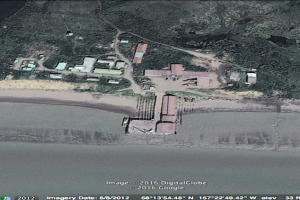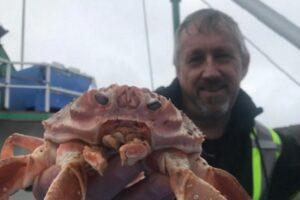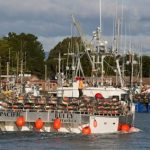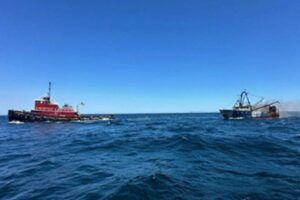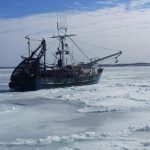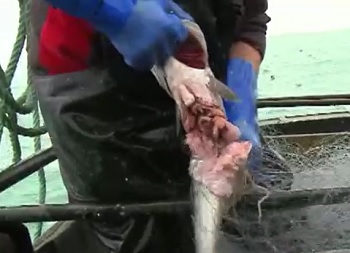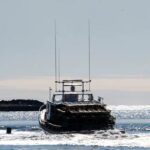 Canada’s top chefs should offer seal meat on their menus as part of the battle against Russian propaganda as well as celebrities who have spoken out against the seal hunt, a senate committee heard. At the same hearing, independent Senator Bev Busson suggested mega-singing star Taylor Swift might be used to convince young people to chow down on seal. But animal rights activists say claims that Russian propaganda is behind the problems of Canada’s seal industry is a bizarre conspiracy theory. Instead, they point to the ban by 35 nations on commercial seal products as the real reason the industry has declined. The ban, however, hasn’t stopped some from looking for new ways to revive the commercial seal industry. more. >>click to read<< 11:33
Canada’s top chefs should offer seal meat on their menus as part of the battle against Russian propaganda as well as celebrities who have spoken out against the seal hunt, a senate committee heard. At the same hearing, independent Senator Bev Busson suggested mega-singing star Taylor Swift might be used to convince young people to chow down on seal. But animal rights activists say claims that Russian propaganda is behind the problems of Canada’s seal industry is a bizarre conspiracy theory. Instead, they point to the ban by 35 nations on commercial seal products as the real reason the industry has declined. The ban, however, hasn’t stopped some from looking for new ways to revive the commercial seal industry. more. >>click to read<< 11:33
Senator Wicker Statement on the $2.9 Million Awarded to Mississippi Fisheries for 2019 Bonnet Carré Spillway Openings
 U.S. Senator Roger Wicker, R-Miss., released the following statement after the U.S. Department of Commerce (DOC) awarded $2,993,283 in federal disaster relief funds to Mississippi’s shrimp and oyster fisheries. The funding is available because DOC declared a “commercial fishery failure” in 2020 after the repeated openings of the Bonnet Carré Spillway in 2019. The state will distribute the funds to fishermen, aquaculture businesses, and seafood processors to help cover some of their losses. “This funding is helpful, but it does not make the impacted businesses whole. It should not take years for disaster funds to trickle in. more, >>click to read<< 13:39
U.S. Senator Roger Wicker, R-Miss., released the following statement after the U.S. Department of Commerce (DOC) awarded $2,993,283 in federal disaster relief funds to Mississippi’s shrimp and oyster fisheries. The funding is available because DOC declared a “commercial fishery failure” in 2020 after the repeated openings of the Bonnet Carré Spillway in 2019. The state will distribute the funds to fishermen, aquaculture businesses, and seafood processors to help cover some of their losses. “This funding is helpful, but it does not make the impacted businesses whole. It should not take years for disaster funds to trickle in. more, >>click to read<< 13:39
Can Taylor Swift help Canada’s seal meat industry, senate committee asks
 Canada’s top chefs should offer seal meat on their menus as part of the battle against Russian propaganda as well as celebrities who have spoken out against the seal hunt, a senate committee heard. At the same hearing, independent Senator Bev Busson suggested mega-singing star Taylor Swift might be used to convince young people to chow down on seal. But animal rights activists say claims that Russian propaganda is behind the problems of Canada’s seal industry is a bizarre conspiracy theory. Instead, they point to the ban by 35 nations on commercial seal products as the real reason the industry has declined. The ban, however, hasn’t stopped some from looking for new ways to revive the commercial seal industry. more. >>click to read<< 11:33
Canada’s top chefs should offer seal meat on their menus as part of the battle against Russian propaganda as well as celebrities who have spoken out against the seal hunt, a senate committee heard. At the same hearing, independent Senator Bev Busson suggested mega-singing star Taylor Swift might be used to convince young people to chow down on seal. But animal rights activists say claims that Russian propaganda is behind the problems of Canada’s seal industry is a bizarre conspiracy theory. Instead, they point to the ban by 35 nations on commercial seal products as the real reason the industry has declined. The ban, however, hasn’t stopped some from looking for new ways to revive the commercial seal industry. more. >>click to read<< 11:33
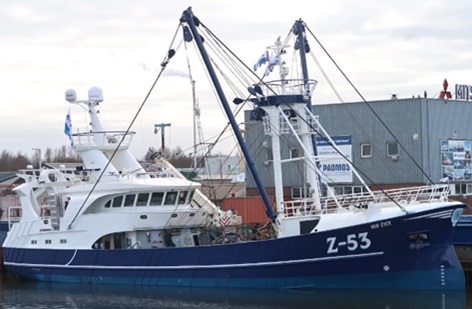
New Beamer Delivered to Belgian Owners
A new beamer is a rarity these days and seeing a new such vessel being put into service is something of an event. The latest beam trawler to be delivered to owners in Belgium is Van Eyck Z-53, handed over to its owners following satisfactory sea trials carried out at the end of last year. The Savels family hads initially looked for a second-hand vessel to replace the 1981-built beamer that Steven Savels bought from Freddy Depaepe more than 25 years ago. But when the search proved inconclusive, with no suitable replacement to be found, they looked at the options for a new trawler and approached Van Eyck Z-53, which has delivered a number of new beamers in recent years to Belgian operators. The order for the new vessel was placed in 2022 and the hull arrived in Stellandam for outfitting a year later. Photos, more, >>click to read<< 10:39
Powerful winter storm pummels the Golden State
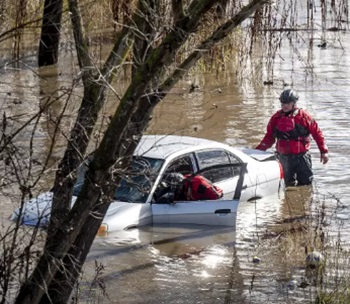 Millions of Southern Californians are waking up to a powerful storm that’s expected to linger over the region through Monday, bringing risks of dangerous flooding, road closures, power outages and other hazards. The slow-moving atmospheric river made its way into Southern California on Sunday afternoon after dousing the Bay Area and Central Coast earlier in the weekend. National Weather Service officials issued flash flood warnings for large swaths of San Luis Obispo, Santa Barbara, Ventura and Los Angeles counties. The warnings were set to expire at 12 a.m. Monday but could be extended. It wasn’t just SoCal; the atmospheric river brought heavy rain and strong winds across the Bay Area and Central Coast earlier Sunday. more, >>click to read<< 09:40
Millions of Southern Californians are waking up to a powerful storm that’s expected to linger over the region through Monday, bringing risks of dangerous flooding, road closures, power outages and other hazards. The slow-moving atmospheric river made its way into Southern California on Sunday afternoon after dousing the Bay Area and Central Coast earlier in the weekend. National Weather Service officials issued flash flood warnings for large swaths of San Luis Obispo, Santa Barbara, Ventura and Los Angeles counties. The warnings were set to expire at 12 a.m. Monday but could be extended. It wasn’t just SoCal; the atmospheric river brought heavy rain and strong winds across the Bay Area and Central Coast earlier Sunday. more, >>click to read<< 09:40
No-farm farm
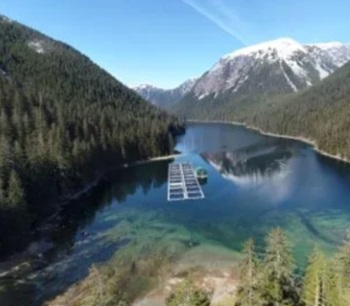 In one of the stranger twists in the strange world of global salmon marketing, Alaska’s non-farm fish farmers played a role in convincing the Canadian city of Ottawa to order removal of billboards protesting farmed salmon. The reason? “False advertising.” And now the same environmental group involved in Ottawa – Wild First – is under fire in British Columbia for running radio advertisements claiming salmon farms have pushed wild Pacific salmon to “the brink of extinction,” according to the news website Business in Vancouver (BIV). That claim is about as far from the truth as one can get. Salmon in the Pacific are today at numbers never seen in recorded history, but most of them are pink salmon. Some scientists contend this explosion of pinks due in part to the free-range fish farming efforts of hatchery operators in Alaska and Russia has reached the point where it is wreaking havoc with the entire North Pacific ecosystem. more, >>click to read<< 07:50
In one of the stranger twists in the strange world of global salmon marketing, Alaska’s non-farm fish farmers played a role in convincing the Canadian city of Ottawa to order removal of billboards protesting farmed salmon. The reason? “False advertising.” And now the same environmental group involved in Ottawa – Wild First – is under fire in British Columbia for running radio advertisements claiming salmon farms have pushed wild Pacific salmon to “the brink of extinction,” according to the news website Business in Vancouver (BIV). That claim is about as far from the truth as one can get. Salmon in the Pacific are today at numbers never seen in recorded history, but most of them are pink salmon. Some scientists contend this explosion of pinks due in part to the free-range fish farming efforts of hatchery operators in Alaska and Russia has reached the point where it is wreaking havoc with the entire North Pacific ecosystem. more, >>click to read<< 07:50
Commercial Fisherman Jimmy Bourque, Sr., of St. Martinville, La, has passed away
 Jimmy Bourque, Sr., a dedicated commercial fisherman, has sadly passed away at the age of 77, in his hometown of St. Martinville. Born on December 11, 1946, Jimmy’s departure on February 3, 2024, has left a void in the hearts of his loved ones and the community he cherished so deeply. Throughout his life, Jimmy exemplified a profound love for the Atchafalaya Basin. His passion for fishing was unmatched, and he would often lose track of time by the sounds of nature and the stillness of the water. The peace and tranquility he found in the Basin was captivating; it was a place where he could rejuvenate his spirit and connect with the natural world. more, >>click to read<< 19:06
Jimmy Bourque, Sr., a dedicated commercial fisherman, has sadly passed away at the age of 77, in his hometown of St. Martinville. Born on December 11, 1946, Jimmy’s departure on February 3, 2024, has left a void in the hearts of his loved ones and the community he cherished so deeply. Throughout his life, Jimmy exemplified a profound love for the Atchafalaya Basin. His passion for fishing was unmatched, and he would often lose track of time by the sounds of nature and the stillness of the water. The peace and tranquility he found in the Basin was captivating; it was a place where he could rejuvenate his spirit and connect with the natural world. more, >>click to read<< 19:06
Torbay lifeboat rescues trawler in dramatic operation off South Devon coast
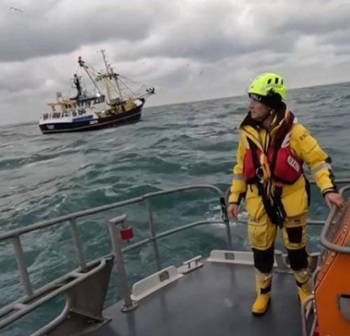 Torbay RNLI received a request from Solent Coastguard to assist the trawler 18 miles south of Start Point – in force eight winds and four metre swells – whose skipper had reported water coming into his engine room. The station’s ‘Deputy Launch Authority’ on duty immediately launched the All-weather lifeboat with seven volunteer crew. The Severn Class ALB reached the trawler within 25 minutes. The RNLI had been informed sea water had reached up to the deck plates from bilges and appeared to be coming in through the propeller shafts. More water appeared when under power, but the exact source and cause could not be identified. Photos, more, >>click here<< 15:45
Torbay RNLI received a request from Solent Coastguard to assist the trawler 18 miles south of Start Point – in force eight winds and four metre swells – whose skipper had reported water coming into his engine room. The station’s ‘Deputy Launch Authority’ on duty immediately launched the All-weather lifeboat with seven volunteer crew. The Severn Class ALB reached the trawler within 25 minutes. The RNLI had been informed sea water had reached up to the deck plates from bilges and appeared to be coming in through the propeller shafts. More water appeared when under power, but the exact source and cause could not be identified. Photos, more, >>click here<< 15:45Aquarium scientists ID dead whale found on Martha’s Vineyard
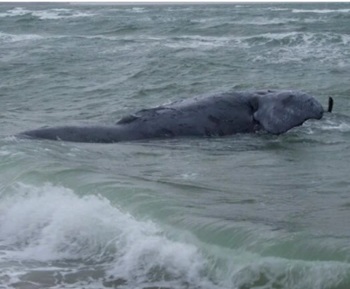 Scientists identified the dead North Atlantic right whale as a 3-year-old female known as #5120. NOAA Fisheries learned that the unnamed whale had washed ashore near Joseph Sylvia State Beach on Martha’s Vineyard on Jan. 28. The animal will undergo a necropsy this week to determine its exact cause of death. The Wampanoag Tribe of Gay Head (Aquinnah) and the International Fund for Animal Welfare secured the whale, according to the aquarium. State law enforcement officials also collected rope entangled around and embedded in the whale’s tail and turned it over to NOAA’s Office of Law Enforcement. In August 2022, researchers found the whale tangled up in fishing gear in the Gulf of St. Lawrence, Canada. Several attempts were made in January and February of 2023 to disentangle the whale after she was located off Cape Cod. more, >>click to read<< 13:01
Scientists identified the dead North Atlantic right whale as a 3-year-old female known as #5120. NOAA Fisheries learned that the unnamed whale had washed ashore near Joseph Sylvia State Beach on Martha’s Vineyard on Jan. 28. The animal will undergo a necropsy this week to determine its exact cause of death. The Wampanoag Tribe of Gay Head (Aquinnah) and the International Fund for Animal Welfare secured the whale, according to the aquarium. State law enforcement officials also collected rope entangled around and embedded in the whale’s tail and turned it over to NOAA’s Office of Law Enforcement. In August 2022, researchers found the whale tangled up in fishing gear in the Gulf of St. Lawrence, Canada. Several attempts were made in January and February of 2023 to disentangle the whale after she was located off Cape Cod. more, >>click to read<< 13:01
All the lives lost in shipwrecks off Cornwall since the end of WWII
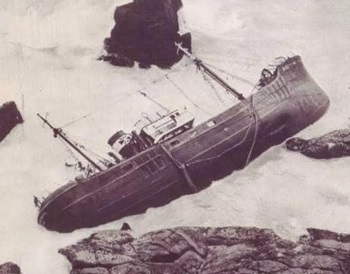 The history of shipwrecks around our coast is long and tragic but is also a story of immense selfless courage exemplified in none other than the Penlee Lifeboat tragedy. Very few incidents have shaken Cornwall to its core as much as the loss of the lifeboat Solomon Browne on that fateful night on December 19, 1981. With winds at hurricane force 12 gusting to 90 knots, the eight-strong crew of the Solomon Browne put to sea that night in an attempt to rescue the eight people on board the coaster Union Star, which had lost power between Tater-du Lighthouse and Boscawen Point. All lives were lost. A permanent memorial stone to all 16 people who lost their lives that day now stands on the cliff above where the tragedy happened. Below is a list of incidents during which crews or passengers were lost at sea off Cornwall’s coast since the end of the Second World War. More than 130 people died in that period. photos, more, >>click to read<< 10:45
The history of shipwrecks around our coast is long and tragic but is also a story of immense selfless courage exemplified in none other than the Penlee Lifeboat tragedy. Very few incidents have shaken Cornwall to its core as much as the loss of the lifeboat Solomon Browne on that fateful night on December 19, 1981. With winds at hurricane force 12 gusting to 90 knots, the eight-strong crew of the Solomon Browne put to sea that night in an attempt to rescue the eight people on board the coaster Union Star, which had lost power between Tater-du Lighthouse and Boscawen Point. All lives were lost. A permanent memorial stone to all 16 people who lost their lives that day now stands on the cliff above where the tragedy happened. Below is a list of incidents during which crews or passengers were lost at sea off Cornwall’s coast since the end of the Second World War. More than 130 people died in that period. photos, more, >>click to read<< 10:45
A Voice for Commercial Fishermen – Sharon Lee Peele Kennedy of Buxton, North Carolina has passed away
 Born February 9, 1956, Sharon Lee Peele Kennedy, a lady known for her beautiful smile and her passion for life, passed peacefully at her home in Buxton on January 26, 2024, with her beloved sons by her side and surrounded by her loving family. Sharon was the force that started NC Catch and became a voice for the commercial fishing industry. Sharon’s name will forever be part of NC Catch, Outer Banks Catch, and the Outer Banks Seafood Festival. Being the daughter of a commercial fisherman, her passion ran deep for the industry. Just as passionate about cooking, Sharon wrote multiple cookbooks and hosted a radio show for the past ten years that carried the name of her cookbooks, “What’s for Supper.” more, >>click to read<< 08:55
Born February 9, 1956, Sharon Lee Peele Kennedy, a lady known for her beautiful smile and her passion for life, passed peacefully at her home in Buxton on January 26, 2024, with her beloved sons by her side and surrounded by her loving family. Sharon was the force that started NC Catch and became a voice for the commercial fishing industry. Sharon’s name will forever be part of NC Catch, Outer Banks Catch, and the Outer Banks Seafood Festival. Being the daughter of a commercial fisherman, her passion ran deep for the industry. Just as passionate about cooking, Sharon wrote multiple cookbooks and hosted a radio show for the past ten years that carried the name of her cookbooks, “What’s for Supper.” more, >>click to read<< 08:55
Fishermen wary of seismic plans for Bass Strait waters
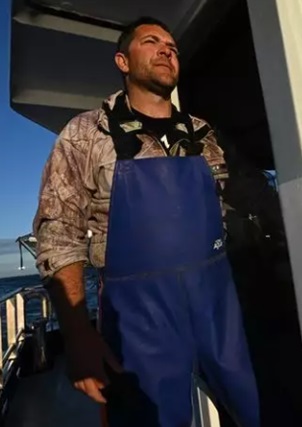 Andrew Smith wants to keep crayfishing long enough to put his children through school. But plans for further seismic testing off his Bass Strait home of King Island have him worried. Energy data company TGS wants to survey for gas across some 4.5 million hectares in the Otway Basin, which are Commonwealth waters between Tasmania and Victoria. Seismic testing has been shown to negatively impact whales as well as other marine life. Tasmanian Seafood Industry Council chief executive Julian Harrington said the testing area was adjacent to rock lobster and giant crab fisheries. He said the waters were a “larvae corridor” for rock lobsters, which have a 15 to 18 month larvae cycle. more, >>click to read<< 07:24
Andrew Smith wants to keep crayfishing long enough to put his children through school. But plans for further seismic testing off his Bass Strait home of King Island have him worried. Energy data company TGS wants to survey for gas across some 4.5 million hectares in the Otway Basin, which are Commonwealth waters between Tasmania and Victoria. Seismic testing has been shown to negatively impact whales as well as other marine life. Tasmanian Seafood Industry Council chief executive Julian Harrington said the testing area was adjacent to rock lobster and giant crab fisheries. He said the waters were a “larvae corridor” for rock lobsters, which have a 15 to 18 month larvae cycle. more, >>click to read<< 07:24
Shrimpers face pricing issues
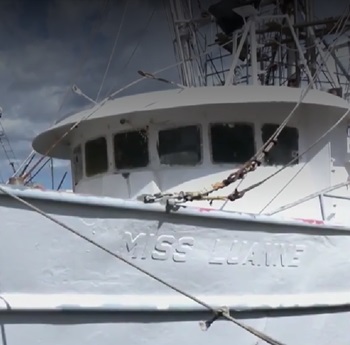 “I’ve been in the business with my parents when they were alive, straight out of high school, which is about thirty something years ago. I have never seen the price of shrimp this low,” said Jose Cuevas Jr., owner of Los Tortugos Seafood Market. Cuevas has a fleet consisting of eleven shrimp boat. He says all of his boats are now sitting idle because it’s not cost effective to go fish. He said it costs 30 to 40 thousand dollars just to fuel up one boat to go out. Other shrimpers are having the same issues with fuel costs keeping them docked. “Usually for us, around this time of year, fuel prices are a dollar fifty. Right now, they’re at close to three dollars, so double,” said Alberto Ochoa, owner of Ochoa Trawlers. Video, more, >>click to read<< 15:02
“I’ve been in the business with my parents when they were alive, straight out of high school, which is about thirty something years ago. I have never seen the price of shrimp this low,” said Jose Cuevas Jr., owner of Los Tortugos Seafood Market. Cuevas has a fleet consisting of eleven shrimp boat. He says all of his boats are now sitting idle because it’s not cost effective to go fish. He said it costs 30 to 40 thousand dollars just to fuel up one boat to go out. Other shrimpers are having the same issues with fuel costs keeping them docked. “Usually for us, around this time of year, fuel prices are a dollar fifty. Right now, they’re at close to three dollars, so double,” said Alberto Ochoa, owner of Ochoa Trawlers. Video, more, >>click to read<< 15:02
Coast Guard finds no pollution after fishing boat runs aground on Cape Cod
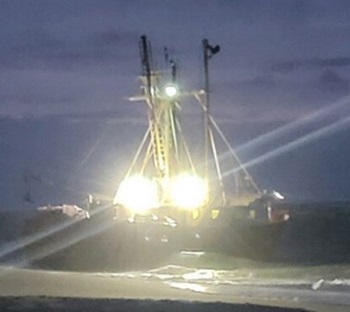 The United States Coast Guard determined there is no pollution after a fishing boat ran aground at Ballston Beach in Cape Cod on Friday. Authorities say they were notified at around 2:30 a.m. that the Miss Megan vessel hat ran aground. No injuries were reported. The boat was refloated at around 5:30 p.m. and towed to New Bedford after it was determined there was no pollution. Click the photos. Photos, >>click to read<< 13:05
The United States Coast Guard determined there is no pollution after a fishing boat ran aground at Ballston Beach in Cape Cod on Friday. Authorities say they were notified at around 2:30 a.m. that the Miss Megan vessel hat ran aground. No injuries were reported. The boat was refloated at around 5:30 p.m. and towed to New Bedford after it was determined there was no pollution. Click the photos. Photos, >>click to read<< 13:05
PR, first aid training tailored for fishermen
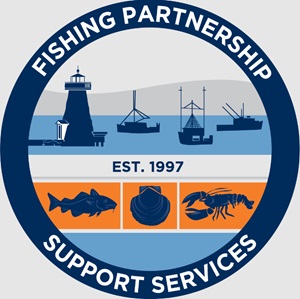 It pays to play it safe. Plus, when it comes to fishing, safety may be job one before the hooks are set and the nets are cast. That sort of self-health maintenance is part of the reason tailored for fishermen is putting out the call to fishermen to sign up for a free, all-day CPR and first aid training class. The class will take place Feb. 9 from 8:30 a.m. to 3 p.m. at the DES Club, 133 Prospect St., Gloucester. The hands-on course will teach lifesaving skills to assess and treat injured or ill crew onboard fishing vessels before emergency personnel arrive, according to the partnership. John Roberts, director of the safety training program for the nonprofit Fishing Partnership Support Services, said he expects at least 30 fishermen to attend the training in Gloucester. more, >>click to read<< 11:06
It pays to play it safe. Plus, when it comes to fishing, safety may be job one before the hooks are set and the nets are cast. That sort of self-health maintenance is part of the reason tailored for fishermen is putting out the call to fishermen to sign up for a free, all-day CPR and first aid training class. The class will take place Feb. 9 from 8:30 a.m. to 3 p.m. at the DES Club, 133 Prospect St., Gloucester. The hands-on course will teach lifesaving skills to assess and treat injured or ill crew onboard fishing vessels before emergency personnel arrive, according to the partnership. John Roberts, director of the safety training program for the nonprofit Fishing Partnership Support Services, said he expects at least 30 fishermen to attend the training in Gloucester. more, >>click to read<< 11:06
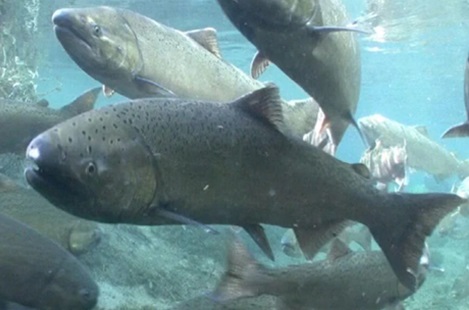
$20M+ in federal funds to California fisheries for disaster relief, $7M+ Oregon
More than $7,000,000 is going to Oregon fisheries as part of $42,000,000 in federal fishery disaster funding. Today, the U.S. Department of Commerce announced allocation of those funds for recovery from fishery disasters in Oregon, Alaska, California, Louisiana, Mississippi, and the Muckleshoot Indian Tribe and Yurok Tribe fisheries from 2017 to 2022. The federal funding will help ocean commercial fishermen in Oregon recover from significant economic losses in 2018, 2019, and 2020 from declining salmon populations. For California, U.S. Department of Commerce Secretary Gina Raimondo announced allocation of $20.6-million to address a fishery resource disaster that occurred in the 2023 Sacramento River Fall Chinook and Klamath River Fall Chinook Ocean and inland salmon fisheries. more, >>click to read<< 10:00
Why Fairer West Coast Fishing Needs More “Boots on Deck,” According to New Report
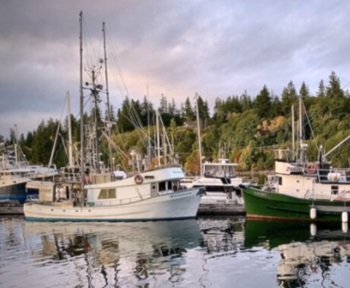 The West Coast fishing industry finds itself in increasingly troubled waters, according to a recent report from the Standing Committee on Fisheries and Oceans (FOPO). The parliamentary committee says unfair regulations and a lack of federal intervention have led to an uneven playing field for BC fishers. Unlike the Maritime provinces, where regulations limit corporate control and prioritize independent harvesters, there are no restrictions on ownership of commercial licenses and quotas on BC’s coast. As a result, owner-operators are often shut out of the process, jeopardizing their ability to make a sustainable living. “Fisheries are the fabric of our coastal communities, and they have been particularly in Indigenous communities for 10 to 15,000 years. Fish in the water are the birthright of all Canadians,” Sonia Strobel, CEO of Skipper Otto Community Supported Fishery, told us in an interview. photos, more, >>click to read<< 07:45
The West Coast fishing industry finds itself in increasingly troubled waters, according to a recent report from the Standing Committee on Fisheries and Oceans (FOPO). The parliamentary committee says unfair regulations and a lack of federal intervention have led to an uneven playing field for BC fishers. Unlike the Maritime provinces, where regulations limit corporate control and prioritize independent harvesters, there are no restrictions on ownership of commercial licenses and quotas on BC’s coast. As a result, owner-operators are often shut out of the process, jeopardizing their ability to make a sustainable living. “Fisheries are the fabric of our coastal communities, and they have been particularly in Indigenous communities for 10 to 15,000 years. Fish in the water are the birthright of all Canadians,” Sonia Strobel, CEO of Skipper Otto Community Supported Fishery, told us in an interview. photos, more, >>click to read<< 07:45
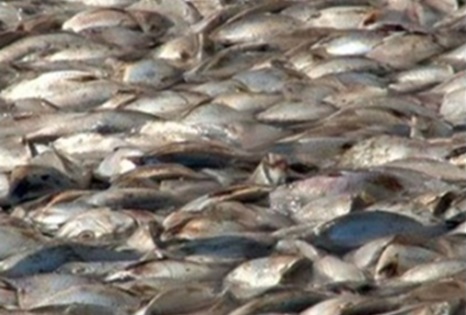
New Rutgers Study Confirms Hypoxic Event Last Summer off the New Jersey Coast by Jim Lovgren
In a scientific report released in December 2023 by Associate Professor Grace Saba, and Professor Josh Kohut using underwater robots, called “Gliders” to track ocean water quality, specifically, oxygen concentrations and PH levels, the researchers discovered that large areas of the New York Bight suffered a hypoxic event last summer. The study suggests that any of a number of factors could have caused these conditions, including a change in normal ocean stratification, increased input of nutrients which increase phytoplankton production, increased sea temperatures, and a few more. Conveniently missing from the possible causes of this hypoxic event is the impact of the offshore wind research vessels that have been extensively using high powered sonar and seismic devises throughout the New York bight area for over a year now. Also ignored was any outreach to the scallop fishermen along the coast who have been reporting unusual amounts of “clappers”, which are dead scallops, in their tows. In an article posted in the spring of 2023 in Fisherynation.com, “Is the Great Fishkill of 1976 About to be Repeated?“, I suggested that the New York bight could see an environmental catastrophe that could rival or surpass the great fish kill of 1976 and would be caused by the decomposing bodies of the dead sea creatures killed by the seismic and Sonar assault on the ocean bottom by offshore wind research vessels. Links, more, >>click to read<< 19:46
Clearwater Seafoods loses redfish quota as other Indigenous harvesters gain
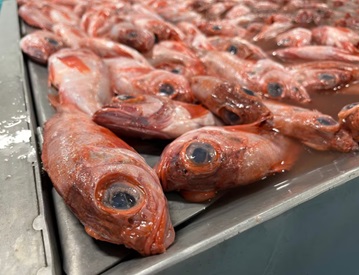 Indigenous-owned Clearwater Seafoods is on the losing side of the redfish quota cut handed to the Atlantic Canadian offshore fleet by the federal government last week. The Department of Fisheries and Oceans reduced the share of Gulf of St. Lawrence redfish quota held by Clearwater and other offshore licence holders by 20 per cent, in part to encourage Indigenous participation in the fishery. Commercial harvesting will restart this year, marking an epic comeback from a collapse 30 years ago to a population now estimated at 2.2-million metric tonnes. Offshore companies spent tens of millions of dollars gearing up for the return only to lose a big piece of their quota on the eve of reopening. photos, more, <<click to read<< 14:11
Indigenous-owned Clearwater Seafoods is on the losing side of the redfish quota cut handed to the Atlantic Canadian offshore fleet by the federal government last week. The Department of Fisheries and Oceans reduced the share of Gulf of St. Lawrence redfish quota held by Clearwater and other offshore licence holders by 20 per cent, in part to encourage Indigenous participation in the fishery. Commercial harvesting will restart this year, marking an epic comeback from a collapse 30 years ago to a population now estimated at 2.2-million metric tonnes. Offshore companies spent tens of millions of dollars gearing up for the return only to lose a big piece of their quota on the eve of reopening. photos, more, <<click to read<< 14:11
Vessel Review: Sorkapp – New Norwegian Stern Trawler Boasts Low Environmental Impact
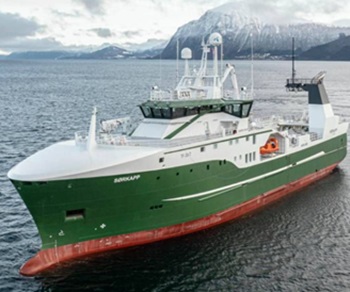 Norwegian fishing company Nergard Havfiske has expanded its vessel fleet following the recent acquisition of a hybrid-powered stern trawler designed and built by compatriot company Vard. The final trawler in a series of three built by Vard for the same owner, Sørkapp (“South Cape”) utilises a design that has been continuously developed to meet the latest demands for fish health management, efficiency, and environmentally friendly operations. Construction of the hull took place at Vard Braila in Romania while completion was carried out at Vard Brattvaag in Norway. The vessel was also built to incorporate efficient technology to bring catch ashore with a minimal environmental footprint, which will then lead to improvements in both catch quality and crew safety as well as more sustainable operations. Photos, more, >>click to read<< 09:52
Norwegian fishing company Nergard Havfiske has expanded its vessel fleet following the recent acquisition of a hybrid-powered stern trawler designed and built by compatriot company Vard. The final trawler in a series of three built by Vard for the same owner, Sørkapp (“South Cape”) utilises a design that has been continuously developed to meet the latest demands for fish health management, efficiency, and environmentally friendly operations. Construction of the hull took place at Vard Braila in Romania while completion was carried out at Vard Brattvaag in Norway. The vessel was also built to incorporate efficient technology to bring catch ashore with a minimal environmental footprint, which will then lead to improvements in both catch quality and crew safety as well as more sustainable operations. Photos, more, >>click to read<< 09:52
DFO ‘intellectually and morally bankrupt’ in provincial redfish allocations, N.L. minister says
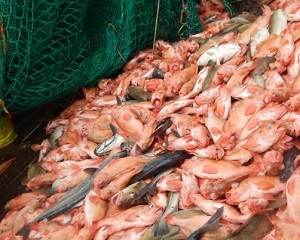 Corner Brook MHA and former provincial fisheries minister Gerry Byrne says Newfoundland and Labrador deserves a higher allocation of redfish this season and is calling the federal Department of Fisheries and Oceans “intellectually and morally bankrupt” in its decision-making. Nova Scotia received 33 per cent of the quota, Québec 32 per cent, New Brunswick 11 per cent and P.E.I. five per cent. Indigenous fishers and shrimp harvesters will also get an allocation of redfish following a reduction in shrimp quotas. more, >>click to read<< 08:59
Corner Brook MHA and former provincial fisheries minister Gerry Byrne says Newfoundland and Labrador deserves a higher allocation of redfish this season and is calling the federal Department of Fisheries and Oceans “intellectually and morally bankrupt” in its decision-making. Nova Scotia received 33 per cent of the quota, Québec 32 per cent, New Brunswick 11 per cent and P.E.I. five per cent. Indigenous fishers and shrimp harvesters will also get an allocation of redfish following a reduction in shrimp quotas. more, >>click to read<< 08:59
Wide-ranging meeting covers gauge changes, ropeless gear, damage repair – DMR to lobstermen: We need your data
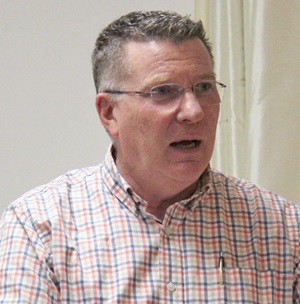 The Maine Department of Marine Fisheries held its January 29 Lobster Zone C Council meeting in Stonington Town Hall, drawing more than four dozen fishermen, marine scientists and local politicians eager to weigh in on a number of policy initiatives. Among the topics: the timeline for changes to gauge and vent sizes that were triggered due to declining juvenile lobster abundance; challenges to Canadian management practices; and plans to spend $17 million allocated last year by Congress to develop better science around lobstering’s impact on North Atlantic right whale mortality. Keliher kicked off the meeting with a discussion of impending gauge-size changes under Addendum XXVII, a management strategy adopt by the Atlantic States Marine Fisheries Commission (ASMFC) to increase protection of the Gulf of Maine/Georges Bank spawning stock. more, >>click to read<< 07:57
The Maine Department of Marine Fisheries held its January 29 Lobster Zone C Council meeting in Stonington Town Hall, drawing more than four dozen fishermen, marine scientists and local politicians eager to weigh in on a number of policy initiatives. Among the topics: the timeline for changes to gauge and vent sizes that were triggered due to declining juvenile lobster abundance; challenges to Canadian management practices; and plans to spend $17 million allocated last year by Congress to develop better science around lobstering’s impact on North Atlantic right whale mortality. Keliher kicked off the meeting with a discussion of impending gauge-size changes under Addendum XXVII, a management strategy adopt by the Atlantic States Marine Fisheries Commission (ASMFC) to increase protection of the Gulf of Maine/Georges Bank spawning stock. more, >>click to read<< 07:57
Rescue operation launched after trawler runs aground in storm force winds
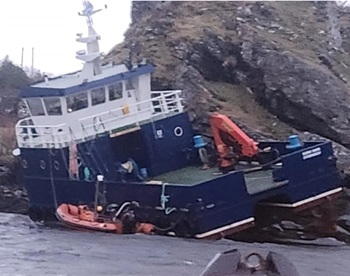 A rescue operation was launched after a vessel with three people on board ran aground in storm force winds. Two RNLI lifeboats went to the scene in the Strome narrows area of Loch Carron after the alarm was raised at 1:45pm on Wednesday. Kyle RNLI lifeboat Spirit of Fred. Olsen arrived on scene at 2:10pm. The lifeboat crew assessed the scene and found the vessel hard aground with the boat’s crew still on board but uninjured. The vessel had been dragging its mooring, and the three people on board had tried to maneuver out of the situation, however a chain had disabled their rudder, resulting in them drifting onto the rocks. more, >>click to read<< 07:03
A rescue operation was launched after a vessel with three people on board ran aground in storm force winds. Two RNLI lifeboats went to the scene in the Strome narrows area of Loch Carron after the alarm was raised at 1:45pm on Wednesday. Kyle RNLI lifeboat Spirit of Fred. Olsen arrived on scene at 2:10pm. The lifeboat crew assessed the scene and found the vessel hard aground with the boat’s crew still on board but uninjured. The vessel had been dragging its mooring, and the three people on board had tried to maneuver out of the situation, however a chain had disabled their rudder, resulting in them drifting onto the rocks. more, >>click to read<< 07:03
Alabama eyes source-disclosure requirements for seafood, whether it was wild-caught or farmed
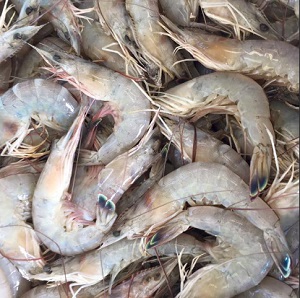 Restaurants in Alabama would be required to reveal the origin of most seafoods on their menu under a bill heading for consideration by the state House of Representatives. The measure would also require all foodservice establishments to indicate whether the fin or shellfish was farm-raised or wild-caught. The country where the fish originated would have to be disclosed via either menus or placards on the wall. The same channels would be used for differentiating between farm-raised and wild-caught proteins. The bill is intended to protect the state’s vibrant seafood industry from foreign competition. Consumers would know when they were supporting local fishermen and when their money was going toward suppliers from outside the United States. more, >>click to read<< 17:06
Restaurants in Alabama would be required to reveal the origin of most seafoods on their menu under a bill heading for consideration by the state House of Representatives. The measure would also require all foodservice establishments to indicate whether the fin or shellfish was farm-raised or wild-caught. The country where the fish originated would have to be disclosed via either menus or placards on the wall. The same channels would be used for differentiating between farm-raised and wild-caught proteins. The bill is intended to protect the state’s vibrant seafood industry from foreign competition. Consumers would know when they were supporting local fishermen and when their money was going toward suppliers from outside the United States. more, >>click to read<< 17:06
Dungeness crab: The West Coast’s forever fishery
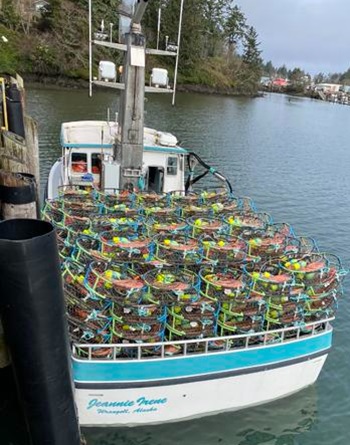 Fourth-generation fisherman Kelsey Cutting has photos of boats prominently displayed in his Long Beach, Wash., dining room. On one side is his grandfather’s old trawler, the Lulu 2, a 35-foot wooden double ender. “The other side I have a picture of my boat, the Jeannie Irene, which is a 50-foot fiberglass boat, and it’s 10 years old. It’s a big difference,” Cutting said. The fishing fleet on the West Coast has gotten bigger and more modern, and the portion of boats that can operate in relatively poor weather has increased, he said. The job remains dangerous, though, and storms can be unforgiving. But there can be a handsome payoff at the docks, especially for Dungeness crab. The West Coast’s top fishery surpassed $200 million in value in Washington, Oregon and California in 2022-23. Photos, more, >>click to read<< 15:46
Fourth-generation fisherman Kelsey Cutting has photos of boats prominently displayed in his Long Beach, Wash., dining room. On one side is his grandfather’s old trawler, the Lulu 2, a 35-foot wooden double ender. “The other side I have a picture of my boat, the Jeannie Irene, which is a 50-foot fiberglass boat, and it’s 10 years old. It’s a big difference,” Cutting said. The fishing fleet on the West Coast has gotten bigger and more modern, and the portion of boats that can operate in relatively poor weather has increased, he said. The job remains dangerous, though, and storms can be unforgiving. But there can be a handsome payoff at the docks, especially for Dungeness crab. The West Coast’s top fishery surpassed $200 million in value in Washington, Oregon and California in 2022-23. Photos, more, >>click to read<< 15:46
Trade groups and state unhappy with federal NOAA Fisheries management plan plan in public comments
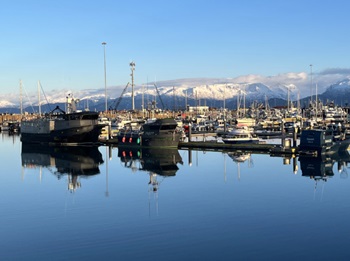 Public comment is in for a NOAA Fisheries management plan for Cook Inlet’s most productive drift fishing waters. In nearly 90 submitted public comments, cities, tribes, trade organizations and the state commissioner of Fish and Game express mixed and negative reactions to the plan. The Cook Inlet Exclusive Economic Zone, or EEZ, was the subject of a lawsuit by the United Cook Inlet Drift Association over management of the fishery, which starts three miles offshore and stretches from south 0 f Kalgin Island to Anchor Point. In response, the federal North Pacific Fishery Management Council closed the fishery in 2020, which was met with protest by Kenai Peninsula commercial fishermen. more, >>click to read<< 10:52
Public comment is in for a NOAA Fisheries management plan for Cook Inlet’s most productive drift fishing waters. In nearly 90 submitted public comments, cities, tribes, trade organizations and the state commissioner of Fish and Game express mixed and negative reactions to the plan. The Cook Inlet Exclusive Economic Zone, or EEZ, was the subject of a lawsuit by the United Cook Inlet Drift Association over management of the fishery, which starts three miles offshore and stretches from south 0 f Kalgin Island to Anchor Point. In response, the federal North Pacific Fishery Management Council closed the fishery in 2020, which was met with protest by Kenai Peninsula commercial fishermen. more, >>click to read<< 10:52
Southeast Texas shrimpers hope two new bills will help keep imported shrimp from taking away their jobs
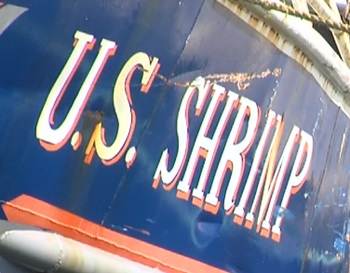 The Port Arthur Shrimper’s Association held an informational meeting Wednesday to help stop shrimp dumping. Shrimp dumping is the heavy importing of shrimp from other countries. Shrimpers in Southeast Texas are also pushing to impose stricter tariffs on imported shrimp. They say regulating the amount and quality of shrimp coming in could save their livelihoods. Two new federal bills could potentially benefit shrimpers and Southeast Texans. Local shrimpers say they aren’t making any money because U.S. businesses are buying imported shrimp at low prices. Video, more, >>click to read<< 09:47
The Port Arthur Shrimper’s Association held an informational meeting Wednesday to help stop shrimp dumping. Shrimp dumping is the heavy importing of shrimp from other countries. Shrimpers in Southeast Texas are also pushing to impose stricter tariffs on imported shrimp. They say regulating the amount and quality of shrimp coming in could save their livelihoods. Two new federal bills could potentially benefit shrimpers and Southeast Texans. Local shrimpers say they aren’t making any money because U.S. businesses are buying imported shrimp at low prices. Video, more, >>click to read<< 09:47
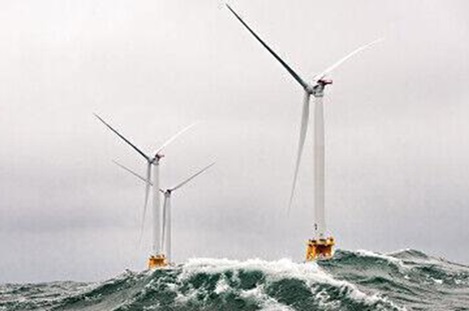
Oregon Coastal Caucus still concerned about offshore wind
Lawmakers representing Oregon’s coastal communities reiterated their concerns about offshore wind development to the Bureau of Ocean Energy Management in a strongly worded letter last week. Organized as the Oregon Coastal Caucus, the January 19 letter urging BOEM to prioritize the concerns of coastal community members and current ocean users was signed by seven Oregon legislators. They are Rep. David Gomberg, Sen. Dick Anderson, Sen. David Brock Smith, Sen. Suzanne Weber, Rep. Boomer Wright, Rep. Cyrus Javadi, and Rep. David Gomberg, Sen. Dick Anderson, Sen. David Brock Smith, Sen. Suzanne Weber, Rep. Boomer Wright, Rep. Cyrus Javadi,. “We cannot move forward with offshore wind in Oregon until the needs and concerns of these groups have been addressed,” the letter stated, noting opposition from the fishing industry, marine scientists, engineers, environmentalists, tribal governments, and coastal municipalities. more, >>click to read<< 08:53






